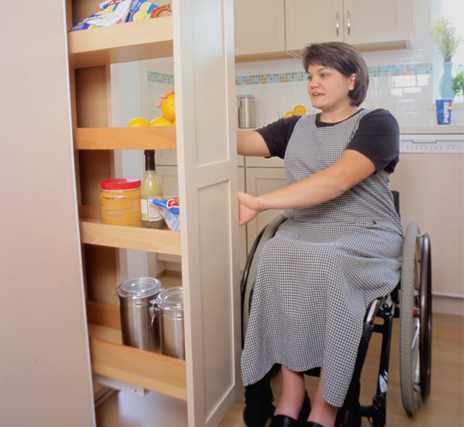Specialist disability accommodation (SDA) providers offer a broad range of support and amenities to NDIS participants in Hobart. These services help patients improve their quality of life and remain living independently.
So, let’s explore the various forms of support and amenities available. By the end of this piece, you will have a better idea of how the scheme improves patient care.
SDA providers in Hobart offer various support services as part of supported independent living (SIL) arrangements. Their support helps patients remain independent in their homes, regardless of their disability.
Eight services that SDA providers supply
1: Personal Care
1: SDA providers in Hobart can provide patients with personal care (if you require it), including toileting, bathing, dressing, and grooming. You have complete choice over who provides you with personal care, and SDA providers should make arrangements to ensure you can work with your preferred staff.
2: Help with daily living
SDA providers can also assist with daily living tasks. These include washing up, preparing meals, cleaning the toilet, and gardening.
Traditionally, carers only offered minimal daily living support, focusing more on the medical side. However, the NDIS now believes it is integral to remaining independent and happy in your home. Consequently, the organisation allocates considerable funding to these tasks, enabling you to live in a clean and healthy environment that supports your wellbeing.
3: Respite care
SDA support can also offer respite care to loved ones who might be currently looking after you. This service gives them a short break (usually less than a month) to spend on other activities so that they can return feeling refreshed.
Don’t worry, the care you receive from SDA providers aims to replicate your routine. You will still enjoy the same meals, bedtime, and assistance around the house. And you may discover that professional services are even more comprehensive than the usual support you receive.
4: Medication management
SDA providers in Hobart also offer medication management. This service ensures you take the proper medications as prescribed by your doctor.
Carers help by arranging medicines in a pill box at the start of the week and recording when each dose is taken. SDA providers can also help with physically taking the pills if you require assistance.
5: Meal management
Meal management is another valuable service SDA providers can provide. Support workers prepare meals for you and even teach you how to cook (if you are able) so that you can make delicious food yourself.
6: Developing social and communication skills
Developing social and communication skills is part of many packages, too. Here, SDA providers can help patients integrate with the community, make friends, and even find educational opportunities.
The NDIS believes that people with disabilities should have opportunities to enjoy community engagements and social activities. And, often, that means building the groundwork that will help you feel more confident and capable during these interactions, preventing you from feeling isolated and away from the rest of society.
7: Skills development
Related to this concept, SDA providers can also assist with skills development. Carers help patients build real-life aptitudes that will help patients in the future, such as managing their finances or using public transport. As patients progress, they can take more control of their life.
8: Live-in care and supervision
SDA providers may also offer 24-hour live-in care and supervision in some cases. The NDIS will fund this service level if you have profound needs that require around-the-clock attention. For example, you might need this level of assistance if you have a mental health condition, acquired brain injury, autism, or severe learning difficulties.
You may also require more extensive support temporarily, such as after an operation. Carers may need to stay with you to provide medication through the night or help you get to the bathroom.
Amenities provided by specialist disability accommodation providers
Besides services, SDA providers also provide amenities. These improve the utility of homes for patients.
Resilient and strong buildings
First, SDA providers ensure buildings are resilient and strong (a requirement of some SDA provisions). Structures must meet basic building requirements and accommodate any devices or technology you require to improve your living situation.
Assistive communication technology
SDA providers must also check that the accommodation has the proper assistive communication technology. Phones, dongles, and computers should allow you to converse with the outside world regardless of disability.
Accessible kitchens and bathrooms
Some types of SDA accommodation must also provide accessible kitchens and bathrooms. Fully accessible homes, for example, have to provide access to kitchen and laundry benchtops from a seated or standing position. All appliances should also be within reach.
Car parking
The SDA Design Standard requires special car parking facilities that enable you to enjoy the benefits of private transport. For example, there should be a safe, continuous, and step-free accessway from the front boundary of the SDA and any car parking space linked to the dwelling. Parking spaces must be large enough to sufficiently accommodate wheelchairs and other mobility devices and sufficiently long for motability vehicles.
Suitable doorways and hardware
SDA homes must also have entrances and other external doorways that meet SDA standards. Ideally, properties should have a level landing area with a maximum gradient of one in 40. Doorway threshold ramps are allowed in the landing area as a substitute.
Covered doorways are required, and step-free external doorways should be available to common or private open spaces. Rules for door handles include installing handles between 900mm and 1100mm above the finished floor level, providing sufficient opening space, and using disability-friendly handle designs.
Suitable internal corridors
Finally, SDA should have appropriate width internal corridors and passageways. Width requirements vary depending on the type of accommodation (whether improved liveability and robust or fully accessible and high physical support).
The final word
SDA providers combine services and amenities to improve your quality of life. Homes and care facilitate independence and aim to give each day meaning and purpose.
“The opinions expressed by BizWitty Contributors are their own, not those of BizCover and should not be relied upon in place of appropriate professional advice. Please read our full disclaimer."







